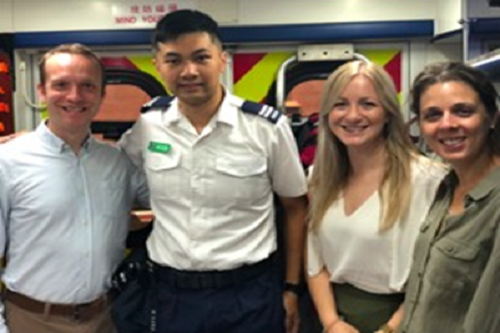
Published Friday, 21st December, 2018 in University news
At this time of year, we often reflect on the highlights of the previous year. This September three City, University of London nursing students visited Hong Kong Polytechnic University (HKPU) for an intensive week-long programme.
During their time in the region, the three postgraduate students visited local health care providers including Yan Chai Hospital, Kowloon Hospital, Castle Peak Psychiatric Hospital and Kowloon Ambulance Depot where they learned about staff training, ranks, equipment and workload.
They also learned more about the philosophy of Traditional Chinese Medicine, briefed their hosts on the UK Health care system and nurse training and exchanged knowledge on pain management strategies in both the UK and Hong Kong.
The visit is part of a long-standing partnership between City and HKPU, who are both members of the WC2 Network of eleven universities which collaborate on challenges and opportunities facing urban areas.
Nicole Seneque and David Kiy, two of the students who travelled to Hong Kong talked to us about their experience:
What was your experience of the exchange programme?
David: I came at this exchange from a slightly different angle as I used to live in Mainland China and have Chinese family. I found it interesting seeing the mix of Chinese and British culture within the healthcare system. It was interesting to see that some of the issues that we struggle with here are similar in HK, for example trying to deal with the stigma and lack of resources for mental health. I also really enjoyed experiencing a university environment in HK and the lectures we had on traditional Chinese medicine and pain management.
What were your impressions of Hong Kong, had you been before?
Nicole: It was my first time in Asia, so imagined it to be a very busy city with tall buildings and lots of people! I expected to try weird and wonderful foods, and for alternative medicines to play a big part in peoples' healthcare. This was all true. It was a very exciting city. But there's a lot more to HK than the hustle and bustle of the city. I was really surprised at the vast locations to go hiking. On one of the weekends we hiked Dragon's Back on Hong Kong Island. I was also amazed at how well the country coped with a signal T10 typhoon! We also took a 25 minute cable car journey to visit the Big Buddha and Po Lin Monastery.
David: I had been to HK once before and it’s a place that I really like. I know East Asia quite well as I spent five years living there, so no cultural surprises, I already eat chicken's feet. The food in HK is less healthy than I was expecting, less fruit and vegetables, I told its due to the lack of space for farming. I enjoyed seeing more of HK,
How will your participation in the programme benefit your further studies/ nursing career?
Nicole: For me, it was to see healthcare in a different part of the world. Last summer I volunteered as a student nurse in Tanzania, so HK gave me a completely different experience. All experiences have made me value the NHS even more than I did. My experiences will help me relate to patients from different countries, cultures and religions. It also adds strength to your CV because it makes you stand out a little bit.
David: This exchange highlighted to me how lucky nurses are in the UK in terms of opportunities for developing skills and advanced practice, for example, nurses in HK cannot prescribe. Equally how initial training in the UK is much less than HK, they cover Adult, Child and basic midwifery as part of their five-year initial training. This encourages me to continue learning in future and to appreciate opportunities for advanced practice.
Would you recommend the exchange programme to future nursing students? If so, why? Nicole: Definitely yes. The university organisers were very organised and communicative. They put together an action-packed week. I would recommend staying for a week extra otherwise you will find yourself too tired. We went to a really interesting evening lecture on pain management, listened to masters students present their research projects, visited a number of hospitals (including a drug and alcohol dependency unit, learning disability ward, general adults and mental health wards. We got to visit their clinical skills labs where there was one for each of the areas of the curriculum e.g. older adult care and ITU.
We recommend staying in an Airbnb within walking distance of the university like we did as this saves money and you get to hang out altogether.
David: I would strongly recommend this exchange to future nursing students. Seeing other ways of training and practising helps us see the good points in what we do and areas to improve. Experiencing other cultures helps us understand our patients and to appreciate their cultural differences. Finally, travel abroad with classmates helps build closer ties which are so beneficial when we begin working as nurses.
If you are interested in placement opportunities available on your course, contact your school office for more information on what is available.
